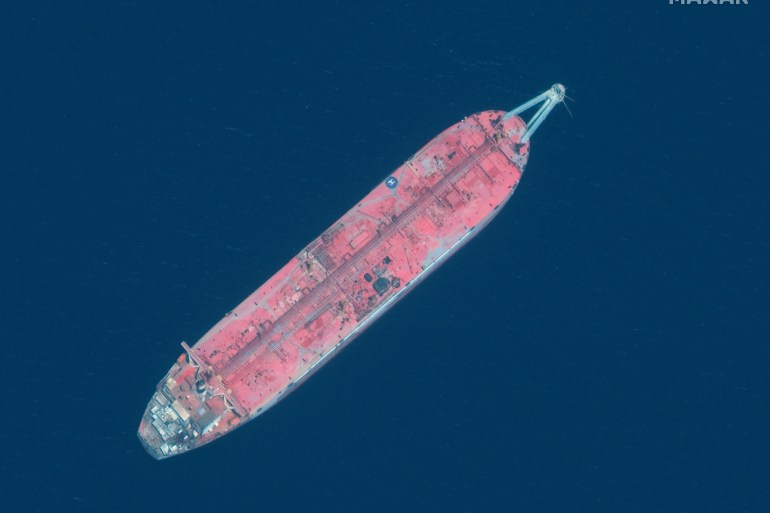US, Netherlands call for action on decaying Yemeni supertanker
The two countries warn of potential economic, environmental and humanitarian effects if FSO Safer spills or explodes.

The two countries issued a joint statement on Friday warning of the potential economic, environmental and humanitarian effects of an oil spill from FSO Safer, which they described as “decaying and unstable”.
“It could leak, spill, or explode at any time, severely disrupting shipping routes in the Gulf region and other industries across the Red Sea region, unleashing an environmental disaster, and worsening the humanitarian crisis in Yemen,” the statement said.
The supertanker has been called a “ticking timebomb” by experts and environmental advocates.
Last month, the United Nations unveiled a plan to offload the oil from the supertanker to a temporary vessel across four months.
“Both the FSO Safer and the temporary vessel would remain in place until all the oil is transferred to the permanent replacement vessel,” the plan reads. “The FSO Safer would then be towed to a yard and sold for salvage.”
The UN said the plan has the backing of the internationally recognised Yemeni government in Aden, and a “memorandum of understanding has been signed” with the Houthi rebels, who control the area where the FSO Safer is located.
On Friday, the US and the Netherlands warned against delaying the plan.
“By October, high winds and volatile currents will make the UN operation more dangerous and increase the risk of the ship breaking apart. In the event of a spill, the cleanup alone is expected to cost $20 billion,” their joint statement read.
Overall funding also appears to be an issue. The scheme would cost $144m, including $80m for the initial emergency operation.
The Netherlands and the US called on governments and the private sector to help finance the effort.
“We urge public and private donors to consider generous contributions to help prevent a leak, spill, or explosion, whose effects would destroy livelihoods, tourism, and commerce in one of the world’s vital shipping lanes,” they said.
They added that a pledging event last month raised nearly half of the amount needed for the emergency operation, but “more is urgently needed to move forward”.
In addition to the environmental threat and danger to international shipping routes, a spill from the supertanker – located west of Ras Issa on the Red Sea – could close the nearby ports of Hodeidah and Saleef, disrupting the flow of vital goods to assistance-dependent Yemen, UN officials have warned.
The US and the Netherlands’ call for action comes amid UN efforts to renew a fragile truce that had brought a halt to the fighting in Yemen since early April. The temporary ceasefire is set to expire at the beginning of June.
“We have sought to consolidate and to reinforce the truce not only because it brings additional stability and security to the people of Yemen, but because it has very practical effects,” US Department of State spokesperson Ned Price said earlier this week.
“It has allowed humanitarian aid to reach individuals in parts of Yemen that have not been able to receive adequate aid for far too long.”
